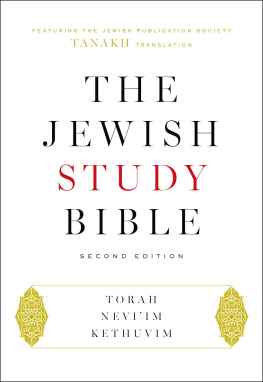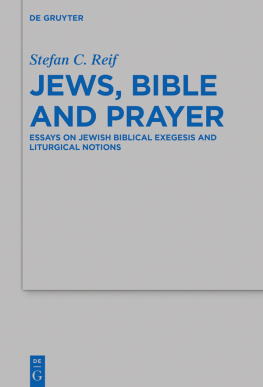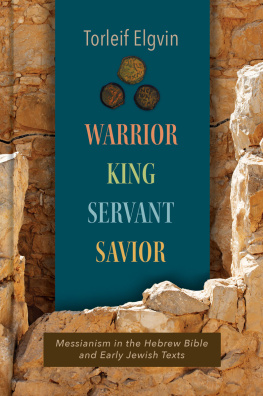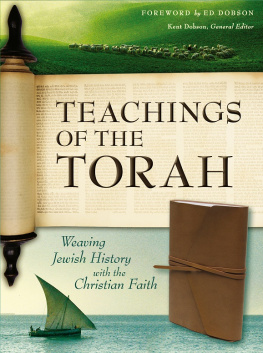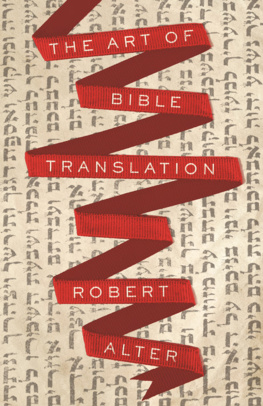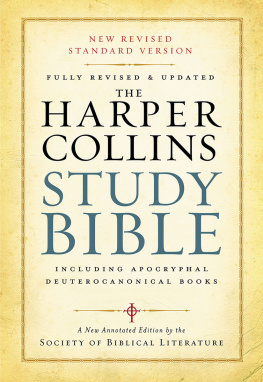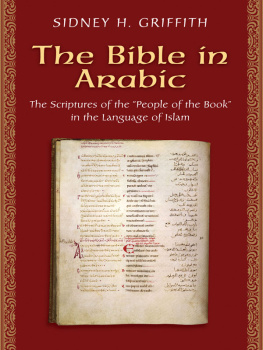EDITORS AND CONTRIBUTORS
Yairah Amit: Judges
Shimon Bar-Efrat: First and Second Samuel [revised by Marc Zvi Brettler]
Amitai Baruchi-Unna: Geography of Biblical Land of Israel
Ehud Ben Zvi: Introduction to The Twelve andThe Twelve Minor Prophets
Adele Berlin: Editor; Introduction: What Is the Jewish Study Bible? [with Marc Zvi Brettler], Psalms [with Marc Zvi Brettler], Introduction to The Five Megillot [with Marc Zvi Brettler], Lamentations, Esther, Introduction to the Essays [with Marc Zvi Brettler], Reading Biblical Poetry
Oded Borowski: Daily Life in Biblical Times
Marc Zvi Brettler: Editor; Introduction: What is the Jewish Study Bible? [with Adele Berlin], Introduction to Torah, Introduction to Neviim, Introduction to Kethuvim, Psalms [with Adele Berlin], Introduction to The Five Megillot [with Adele Berlin], Introduction to the Essays [with Adele Berlin], Modern Jewish Interpretation, The Canonization of the Bible, Gender in the Bible
Edward Breuer: Jewish Biblical Scholarship from the 17th to the 19th Centuries
Yaakov Elman: Classical Rabbinic Interpretation
Esther Eshel: The Bible in the Dead Sea Scrolls Steven E. Fassberg: Languages of the Bible
Michael Fishbane: The Bible in the Jewish Mystical Tradition
Michael V. Fox: Proverbs Nili S. Fox: Numbers Tova Ganzel: Ezekiel
Stephen A. Geller: The Religion of the Bible Leonard J. Greenspoon: Jewish Translations of the Bible
Edward L. Greenstein: Job Shalom E. Holtz: Reading Biblical Law
Victor Avigdor Hurowitz: The Temple [edited by Adele Berlin and Marc Zvi Brettler]
Jonathan Klawans: Concepts of Purity in the Bible Ruth Langer: The Bible in the Liturgy
Jacob Lassner: The Hebrew Bible and Biblical Exegesis in the Quran and Muslim Tradition
Jon D. Levenson: Genesis Amy-Jill Levine: Use of the Hebrew Bible in the New Testament
Baruch A. Levine: Biblical Festivals and Fast Days Bernard M. Levinson: Deuteronomy
Oded Lipschits: The History of Israel in the Biblical Period Peter Machinist: Ecclesiastes
Aren M. Maeir: Archeology and the Hebrew Bible
Hindy Najman: Ezra, Nehemiah, Early Nonrabbinic Interpretation
Jordan S. Penkower: The Development of the Masoretic Bible
Adele Reinhartz: Ruth, Jewish Womens Scholarly Writings on the Bible
Dalit Rom-Shiloni: Jeremiah David Rothstein: First and Second Chronicles
Jonathan D. Sarna: The Jewish Bible in America
Jack M. Sasson: On the Bible and the Ancient Near East Baruch J. Schwartz: Leviticus
Avigdor Shinan: The Bible in the Synagogue Uriel Simon: The Bible in Israeli Life
Benjamin D. Sommer: Isaiah, Inner-biblical Interpretation Daniel Sperber: Jewish Customs
David Stern: Midrash and Jewish Exegesis Elsie Stern: The Song of Songs
Sacha Stern: Biblical Calendars
Marvin A. Sweeney: Historical and Ideal Davidic Kingship, The Modern Study of the Bible
Jeffrey H. Tigay: Exodus Hava Tirosh-Samuelson: The Bible in the Jewish Philobsophical Tradition
Emanuel Tov: Textual Criticism Barry D. Walfish: Medieval Jewish Interpretation
Nili Wazana: Joshua Lawrence M. Wills: Daniel Jacob L. Wright: War and Peace in the Bible
Yair Zakovitch: Reading Biblical Narrative Ziony Zevit: First and Second Kings

Oxford New York
Auckland Cape Town Dar es Salaam Hong Kong Karachi
Kuala Lumpur Madrid Melbourne Mexico City Nairobi
New Delhi Shanghai Taipei Toronto
With offices in
Argentina Austria Brazil Chile Czech Republic France Greece
Guatemala Hungary Italy Japan Poland Portugal Singapore
South Korea Switzerland Thailand Turkey Ukraine Vietnam
Copyright 2004, 2014 by Oxford University Press USA
Published by Oxford University Press USA
198 Madison Avenue, New York, New York 10016
www.oup.com
ISBN 9780199978465
ebook ISBN 9780199393879
Oxford is a registered trademark of Oxford University Press
All rights reserved. No part of this publication may be reproduced, stored in a retrieval system, or transmitted, in any form or by any means, electronic, mechanical, photocopying, recording, or otherwise, without the prior written permission of Oxford University Press.
Jewish Publication Society TANAKH translation copyright 1985, 1999 by the Jewish Publication Society
Contents
Tables and Charts
Maps and Index to Maps
The seven days of creation
The table of nations
The geography of the ancestral narratives
Probable exodus route according to the Bible
Chart of the Decalogue in Exodus
The structure of the Tabernacle
Chart of the Decalogue in Deuteronomy
Chiastic structure of Deuteronomy 12.1319
The literary structure of Deuteronomys conclusion
Original form of Deuteronomy 32.43
The conquest of Canaan
The Levitical cities
Important cities mentioned in the book of Judges
Sites mentioned in connection with the Benjaminite War
The activity of Samuel
Wanderings of the Ark of the Covenant
The kingdom of Saul
Davids early career and his flight from Saul
The kingdom of David
Solomons twelve administrative districts
The Temple and palace of Solomon
The divided monarchy
Places associated with the Elijah narratives
Places associated with the Elisha narratives
Assyria and Israel and Judah
Places associated with Sennacheribs invasion of Judah
Babylonia and Judah ca. 600 bce
Places mentioned in the oracles against the nations
Tribal territories in the restored Israel
The Temple of Solomon
The kingdom of Solomon
Biblical books from Judean Desert finds
Some Tannaitic Rabbis
Some Amoraic Rabbis
The orders and tractates of the Mishnah
A Miqraot Gedolot, Vilnius 1907
Biblical impurities
Some liturgical uses of Psalms in Jewish tradition
Canons of the Bible
Color Maps follow the last page of the Index
more than twenty-five centuries have passed since an anonymous Jewish poet wrote an elaborate and lengthy prayer that included this exclamation:
O how I love Your teaching!
It is my study all day long (Ps. 119.97 ).
These two themesthe love for Torah (teaching) and dedication to the study of ithave characterized Jewish reading and interpretation of the Bible ever since. The love is the impetus for the study; the study is the expression of the love. Indeed the intensity with which Jews have examined this text through the centuries testifies both to their love of ita love combined with awe and deep reverenceand to their intellectual curiosity about it. That tradition of impassioned intellectual engagement continues to the present day.

